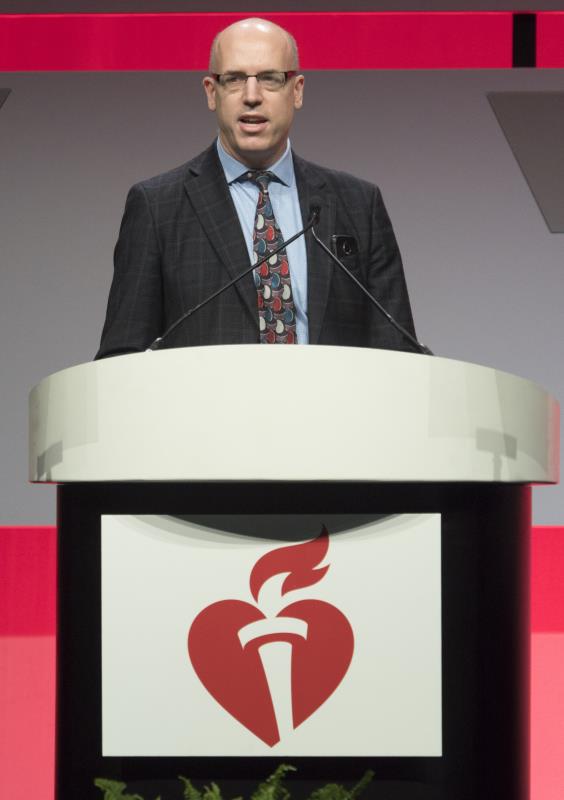 Professor Michael Hill (copyright American Heart Association - Photo by Phil McCarten 2020)
Professor Michael Hill (copyright American Heart Association - Photo by Phil McCarten 2020)The eicosapeptide nerinetide did not improve outcomes in patients with large vessel occlusion-related acute ischaemic stroke who underwent endovascular thrombectomy (EVT). However, patients not treated with alteplase appeared to derive some benefit, results from the multinational ESCAPE-NA1* trial showed.
“Although we did not observe a treatment benefit of nerinetide for the primary outcome in the trial population as a whole, a large absolute benefit was observed for patients who received nerinetide and were not treated with usual-care alteplase. This surprising finding is evidence of a modification of the effect of nerinetide, possibly due to a drug–drug interaction between nerinetide and alteplase,” said the authors led by Professor Michael Hill from the Foothills Medical Centre (FMC), University of Calgary, Calgary, Canada.
Within 12 hours of symptom onset, 1,105 adults with a disabling acute ischaemic stroke due to large vessel occlusion (ASPECTS** 5–10; NIHSS*** >5) were randomized to receive either a single dose of intravenous (IV) nerinetide (2.6 mg/kg [270 mg max based on weight]; n=549, mean age 71.5 years, 48.8 percent female) or placebo (n=556, mean age 70.3 years, 50.5 percent female). EVT was attempted in all patients, and IV alteplase was administered as indicated (60.1 and 59.2 percent of patients assigned to nerinetide and placebo, respectively).
Functional independence at 90 days (modified Rankin Scale [mRS] score 0–2) was achieved by a comparable number of patients who received nerinetide and placebo (61.4 percent vs 59.2 percent; adjusted risk ratio [adjRR], 1.04, 95 percent confidence interval [CI], 0.96–1.14; p=0.35). [ISC 2020, abstract LB2; Lancet 2020;doi:10.1016/S0140-6736(20)30258-0]
A similar proportion of patients on nerinetide and placebo achieved NIHSS 0–2 (58.3 percent vs 57.6 percent; adjRR, 1.01), as well as functional independence in activities of daily living (Barthel index score ≥95; 62.1 percent vs 60.3 percent; adjRR, 1.03), and excellent functional outcome (mRS 0–1; 40.4 percent vs 40.6 percent; adjRR, 0.98). There were 67 and 80 deaths in the nerinetide and placebo groups, respectively.
Serious adverse events (AEs) occurred at a comparable rate between groups (33.1 percent vs 35.7 percent for nerinetide vs placebo). The most common AEs among nerinetide recipients were stroke-in-evolution (6.6 percent), pneumonia (4.6 percent), symptomatic intracranial haemorrhage (3.5 percent), and new or recurrent ischaemic stroke (3.3 percent).
Improvements in the absence of alteplase
Exploratory analyses showed that among the 446 patients who did not receive alteplase, nerinetide conferred improvements in functional independence and mortality at 90 days vs placebo (mRS score 0–2: 59.3 percent vs 49.8 percent; adjRR, 1.18, 95 percent CI, 1.01–1.38; mortality: 7.5 percent absolute risk reduction; adjusted hazard ratio, 0.56, 95 percent CI, 0.35–0.95). Conversely, there was no between-group difference in achieving mRS score 0–2 among patients who received alteplase.
“Compared to placebo, almost 20 percent more patients who received nerinetide along with endovascular treatment, but did not receive alteplase, recovered from a devastating stroke – a difference between paralysis and walking out of the hospital,” said Hill. “In the patients who received both drugs, the alteplase negated the benefits of the nerinetide.”
In the no-alteplase group, median infarct volume was lower with nerinetide vs placebo, with no between-group difference among alteplase recipients. There was also no between-group difference in terms of infarct volume based on endovascular device.
According to the researchers, the improvements with nerinetide in the no-alteplase group appear to rule out “a chance finding”, though further research is required to confirm this. “The absence of benefit of nerinetide in the alteplase stratum is likely to be due to enzymatic cleavage of nerinetide by plasmin, leading to subtherapeutic concentrations of nerinetide,” they suggested.
A new therapeutic option?
“We really believe this is a new scientific observation,” noted Hill. “There is evidence nerinetide promotes brain cell survival, offering neuroprotection until we can extract the clot. It opens the door to a new way of treating stroke.”
“After so many studies investigating neuroprotective drugs failed, we are extremely excited by these results. While nerinetide is not approved for use yet, it shows the potential of a new tool to promote recovery from stroke,” added co-author Professor Mayank Goyal, also from FMC.